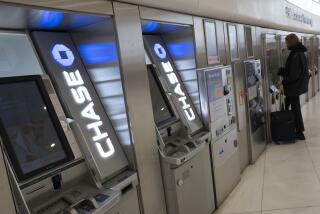FCC Releases Plans to Slash Phone Firms’ Access Fees
- Share via
WASHINGTON — Federal regulators on Tuesday unveiled proposals to cut the $23.4 billion fees that long-distance carriers pay local phone companies each year to connect toll calls to businesses and homes.
If the Federal Communication Commission’s plans are approved and telephone carriers pass along the savings, residential and business customers could see a huge drop in their phone rates.
But a large cut in the fees--one of the largest single sources of local phone company revenue--could cause a major loss of funds that would slow the already-cautious efforts to modernize local telephone networks.
“How these items get decided is really the make-or-break issue for all of these new” rivals to the local phone carrier, said David J. Roddy, chief telecommunications economist, for Deloitte & Touche Consulting Group’s Atlanta office. “This sets the ground rules for how interested these new entrants will be in developing new infrastructure and providing new services.”
The connection fees--called access fees--are among the most controversial element of a trilogy of sweeping, but arcane, telephone regulations being developed by the FCC that will affect how rapidly competition will develop in the local phone business. Access fees were instituted after the breakup of the old AT&T; telephone monopoly in 1984.
The federal effort to reform access fees is one of three FCC initiatives at the core of the landmark telecommunications law enacted in February and aimed at driving down prices and making telecommunications service more widely available. The agency has also developed pricing and service rules for phone rivals and has launched an investigation into how to subsidize telephone service in high-cost areas.
The FCC gave no indication of how it would resolve the access fee issue, and invited industry comments on the plans. A final resolution is expected in the spring.
But in a victory for the fledgling community of Internet service providers, the agency put off a decision on whether such companies should be required to pay special usage fees. Because many Internet service providers now offer flat-rate access, customers increasingly stay connected to the telephone network for hours at a time.
Internet service providers, said the FCC, “should not be subject to interstate access charges as currently constituted.” But the agency asked for public comment on how it can “create incentives for the deployment of services and facilities to allow for more efficient transport of [Internet] data traffic.”
Of the $23.4 billion in access charges, about $13 billion is directly paid by long-distance carriers to local phone companies. The remaining $10 billion is made up of subscriber line charges paid by consumers and other special access charges paid by users.
For years, long-distance carriers and other critics have argued that the government could save consumers billions of dollars by slashing access charges to a local phone company’s “actual costs,” a term that includes not only a phone company’s expenses, but also taxes, depreciation and profit.
“The fastest way to reduce the cost of long-distance rates and to boost consumer demand is to abolish the $14 billion of inflated access charges,” said Jonathan B. Sallet, chief policy counsel at MCI Communications Inc.
Local phone company officials acknowledge that access fees, which average about 35 cents for every dollar spent on a long-distance call, exceed their actual costs. But fearing a dramatic loss of income, they want the FCC to let market forces gradually bring down the fees.
“The commission must strike a balance that allows the industry flexibility to price services competitively, while preserving reliable and affordable basic phone service to all Americans,” said Roy Neel, president of the United States Telephone Assn., in a statement issued Tuesday by the Washington-based trade group.
But striking that balance will depend in large measure on the outcome of one of the FCC’s other major regulatory initiatives: universal telephone service.
That’s because part of the access fee goes to subsidize local phone service in high-cost areas, such as poor, rural, and other hard-to-reach areas.
What’s more, Congress has mandated that universal service be extended to include schools and certain health care facilities, an effort that could cost as much at $2 billion a year over the next decade.
“The only way to achieve this balance is to ensure the new funding mechanisms for universal service allow local telephone companies to recover the actual costs of providing local service,” Neel said.
More to Read
Sign up for Essential California
The most important California stories and recommendations in your inbox every morning.
You may occasionally receive promotional content from the Los Angeles Times.













